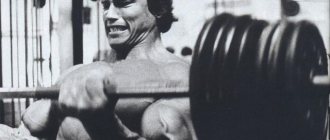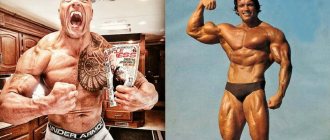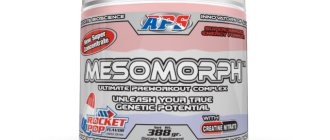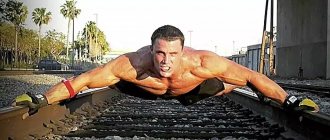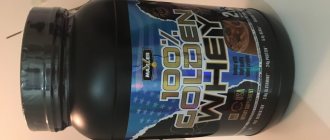| Pumping iron | |
| Theatrical release poster | |
| Director |
|
| Produced |
|
| Written |
|
| Starring |
|
| Music from | Michael Small |
| Edited |
|
| Manufacturing Company | White Mountains |
| Distributed by | Cinema 5 |
| release date | January 18, 1977 |
| Duration | 85 minutes |
| Language | English |
| Budget | 1 million dollars |
Pumping iron
A 1977 American docu-drama about the world of professional bodybuilding, focusing on the 1975 IFBB Mr. Universe and 1975 Mr. Olympia competitions. Directed by George Butler and Roberta Fiore, edited by Jeff Bartz and Larry Silk, it is inspired by the book of the same name by Butler and Charles Gaines, and nominally focuses on the competition between Arnold Schwarzenegger and one of his main rivals for the Mr. Olympia title, Lou Ferrigno. The film also contains segments about bodybuilders. Franco Columbu and Mike Katz, in addition to appearances by Ken Waller, Ed Corney, Serge Nubret, and other famous bodybuilders of the era.
Filmed in the 100 days leading up to the Mr. Universe and Mr. Olympia competitions, as well as during the competitions themselves, the filmmakers ran out of funds to complete production and production was halted for two years. Ultimately, Schwarzenegger and the other bodybuilders featured in the film helped raise funds to complete production, and it was released in 1977. The film was a box office success, making Schwarzenegger a household name. The film also served to popularize bodybuilding culture, which was somewhat niche at the time, and helped inspire the fitness craze of the 1980s; After the film's release, the number of commercial theaters in the United States increased noticeably.[1]
The film was released on CED and VHS and then re-released on DVD in 2003 to celebrate the 25th anniversary of its theatrical debut. The film inspired three sequels: George Butler. Pumping Iron 2: Women
(1985), a documentary about the world of women's bodybuilding;
David and Scott McVeigh Raw Iron
(2002), a documentary about the making of
Pumping Iron
and how the film affected the lives of those in it;
and Vlad Yudins Generation Iron
(2013), a documentary about which
Pumping Iron
producer Jerome Gary served as executive producer.
plot
In 1975, bodybuilders are preparing for the upcoming amateur Mr. Universe and Mr. Olympia professional competitions in Pretoria, South Africa. The first part of the film tells about the life of Mike Katz, a contender for the title of Mr. Universe. In his youth, Katz was bullied for being Jewish and wearing glasses, which motivated him to become a professional football player; When his career with the New York Jets ended with a leg injury, he became a bodybuilder. His psychological balance is disrupted due to his opponent's joke. Ken Waller, who steals Katz's lucky shirt before the competition. Waller wins Mr. Universe and Katz comes in fourth. Fighting back tears, Katz cheerfully assesses the situation before calling home to check on his wife and children. He then congratulates Waller.
The film then turns its attention to the rivalry between Arnold Schwarzenegger and Lou Ferrigno, professional bodybuilders vying for the Mr. Olympia title. Schwarzenegger, a 10-year bodybuilding veteran, has won Mr. Olympia five years in a row and plans to retire after the final competition. Ferrigno, who at 6 feet 5 inches (1.96 m) and 275 pounds (125 kg) is the largest bodybuilder today, is determined to be the man who finally dethrones Schwarzenegger. The film contrasts each man's personality, home environment, and training style: Schwarzenegger is extroverted, aggressive, and trains with other bodybuilders at Gold's Gym and Muscle Beach, while the quiet, reserved Ferrigno, who is partially deaf after a childhood ear infection, trains with his father. in a dimly lit private gym in the basement. While Ferrigno surrounds himself with his family, Schwarzenegger is accompanied wherever he goes by other bodybuilders, reporters and beautiful women.
Between interviews and workout demonstrations with Ferrigno and Schwarzenegger, the latter explains the basic concepts of bodybuilding. Although he emphasizes the importance of physique in bodybuilding, Schwarzenegger also emphasizes the psychological aspects of competition, crediting carefully crafted psychological warfare strategies against his opponents for his many victories. The film briefly looks at Schwarzenegger's training partner, Franco Columbu, the favorite to win the 200-pound weight class at the Mr. Olympia. A former boxer from the tiny village of Ollolai, Sardinia, Columbu returns home to celebrate a traditional dinner with his family, who still adhere to old world values and are skeptical of the overt aggression of boxing and bodybuilding. However, Columbu impresses his family with a show of strength, lifting the back of the car and moving it down the street.
In South Africa, Schwarzenegger wages his own psychological war on Ferrigno, befriending Ferrigno and then subtly insulting him over breakfast with the Ferrigno family. Schwarzenegger later attends the 200-pound judging to find out who his opponent is for the overall Mr. Olympia title, jokingly disparaging Columba. Ed Corney's appearance stuns Schwarzenegger, who praises another bodybuilder for the first time in the film, openly admiring Corney's physique and his posing skills. Columbu takes first place and moves on to compete with the winner in the over 200 pound category.
Schwarzenegger, Ferrigno and Serge Nubret prepare to take the stage and compete in the over 200 pound category. In the dressing room, Schwarzenegger intimidates Ferrigno at the last moment, who is visibly shaken on stage and subsequently comes in third place behind Nubret and Schwarzenegger, who is declared the winner. Schwarzenegger and Columbu pose for the Mr. Olympia title. Schwarzenegger uses his stage presence and intimidating looks to unnerve Columba and is declared Mr. Olympia. In his speech after the victory, he announces his official retirement from professional bodybuilding. Later, at the participants' after-party, Schwarzenegger celebrates his victory by smoking. marijuana and eating fried chicken. At the end of the competition, he wishes Ferrigno a happy birthday and leads the other contestants in singing "Happy Birthday to You" like a cake. The film ends with Schwarzenegger, Ferrigno and Ferrigno's parents driving to the airport together.
Faster, stronger, more powerful (Bigger Stronger Faster)
America defines itself as the largest, strongest and fastest growing country in the world. Director Christopher Bell sheds light on the lives of American bodybuilders in Faster, Stronger, More Powerful, which tells the story of three brothers, two of whom are obsessed with steroid use. The visually beautiful comedy and documentary film describes the US government's views on the use of steroids and nutritional supplements to increase muscle mass. The film also features statements from members of Congress, bodybuilders, and medical experts and their views on the excessive use of steroids. [eleven]
Production
The film began as a look at bodybuilding from the perspective of someone new to the sport; To this end, the production hired lanky actor Bud Cort, with the intention of tracing Cort's development from a physically thin man to a muscular and strong bodybuilder. Cort trained at Gold's Gym for a short period of time, taking lessons from Schwarzenegger, but ultimately felt he was not suited for the project; Court and the producers amicably parted ways, and the production team began paying closer attention to Gold's acclaimed bodybuilders.[1]
To compensate for the loss of Court's storyline, Butler decided to capitalize on the contrasting personalities of Schwarzenegger and Ferrigno and frame the film as the story of a heroic, but "sinister" underdog (Ferrigno) versus a charismatic, powerful "villain" (Schwarzenegger). ).[1] To this end, Butler deliberately avoided filming Ferrigno's workouts with bright lighting and emphasized the open-air atmosphere of Gold's Gym and the sunshine of Muscle Beach for Schwarzenegger's workouts. Schwarzenegger claims to have helped Butler play the role of the villain, citing his story of not returning home for his father's funeral, told to him by a French bodybuilder; however, following the film's release, reports emerged that Schwarzenegger had in fact refused to attend the funeral.[2][3] Butler also cast Mike Katz and Ken Waller's relationship as a sinister rivalry, filming a "football scene" where Waller decides to steal Katz's jersey after the fact to fill a gap in the narrative. In reality, Waller and Katz were close friends, and Waller's shirt-stealing was simply an off-the-cuff prank not intended to upset Katz to the extent that it did. Waller later regretted the football scene, claiming that spectators at bodybuilding competitions continued to boo him for years after the film's release.[1][4]
After the Mr. Olympia competition, the production ran out of money and found itself in development hell for almost two years. In an attempt to raise funds, Butler organized an exhibition with the Whitney Museum of American Art in New York: Bodybuilders will become "living sculptures", posing on rotating platforms, while art critics analyze the aesthetics of bodybuilding physiques and compare and contrast men with Greek sculpture. To increase interest in the event, Butler arranged for Candice Bergen to be the celebrity commentator; Schwarzenegger also agreed to appear as one of the "living sculptures", receiving modest attention for his Golden Globe-winning appearance in the film Stay Hungry
. The event proved to be a great success, bringing in more money than Butler expected and allowing him to complete production of the film.[1][4]
After its release Pumping Iron
became a commercial and critical success.
Schwarzenegger's popularity grew beyond what Stay Hungry
. Shortly thereafter, Ferrigno was cast as The Incredible Hulk, a role he would continue to play in various mediums into the 2010s. Although bodybuilding was a subculture many considered equal to the early 20th century freak show before the film's release, [5] the film normalized the idea to the point that interest in bodybuilding began to spread into mainstream American culture. In the years following the film's release, hundreds of commercial gyms began popping up across the United States as demand for weightlifting equipment increased.[1]
CT Fletcher: My Magnificent Obsession
Fletcher, a six-time world weightlifting champion whose powerful strength, muscular physique and life story has inspired many around the world. The documentary chronicles Fletcher's life, the physical abuse he suffered as a child and his heart surgery in 2005. He himself claims that his heart problems were associated with his constant overeating of fast food. Full recovery after the operation lasted two years; Fletcher had to adjust his training and nutrition, but he did not cancel going to the gym, despite health complications. The film masterfully portrays Fletcher's story, which is full of emotions and reasons why you should never give up. [8]
Reception
The film received positive reviews from critics. As of December 2022, Rotten Tomatoes reported that 32 out of 35 reviews were positive, giving the film a 91% approval rating.[6] The website summarized the critics' consensus as follows: "In addition to offering an eye-opening look into the world of future star/politician Arnold Schwarzenegger, Pumping Iron
provides a witty and insightful overview of competitive bodybuilding."[6] On Metacritic, the film has a score of 72%, based on reviews from 12 critics, indicating "generally favorable reviews".[7]
Richard Eder of the New York Times
called the film "an interesting, fairly illuminating and overly long documentary about the small but very competitive world of bodybuilding."[8]
Variety
wrote: "The technical credits are generally excellent, and Fiore's cinematography is a major asset.
The commercial aspects will depend on the interest of local markets in the sport itself. Of course, after the first quarter of an hour of muscle training, they all begin to look the same to those who do not like sports. -athletic viewer."[9]Gene Siskel of the Chicago Tribune
gave the film three and a half stars out of four and wrote: "The movie gives us a very good look at the two bodybuilders, and as a result, Pumping Iron is very much a story people than this freak show. In the end, I didn't care who won the competition."[10] It was ranked #9 on their year-end list of the best films of 1977.[11]
Kevin Thomas of the Los Angeles Times
wrote: "Directed by Butler and Robert Fiore, who is also the film's very deft cinematographer, the witty and entertaining Pumping Iron confronts what has generally been considered a rather exotic subculture with supreme sophistication."
Butler and Fiore consider bodybuilders to be particularly sophisticated. neither compassion nor ridicule, but rather a stoic, cool detachment - even when they themselves are openly manipulating - which makes for a deft, insightful, very funny and very enjoyable experience."[12] Gary Arnold of the Washington Post
called it "a funny, upbeat documentary about competitive bodybuilding" and noted that "Schwarzenegger is the first figure since Bruce Lee who can become a unique and credible
physical
star who is idolized, particularly by children." , but which is admired and admired by large sections of the public."[13]
Louise Sweet of the Monthly Movie Bulletin
wrote that Schwarzenegger "incites envy rather than disgust with ostentatious musculature, and lures even the reluctant viewer into his unusual world. Almost all of the bodybuilders here are likable, but Schwarzenegger's articulation and humor make the film coherent and compelling."[14]
Ronnie Coleman: The King
One of the new films is a documentary about Ronnie Coleman with the same name, “Ronnie Coleman: The King.” The film chronicles the life and greatest achievements of the eight-time Mr. Olympia champion. If Ronnie is your role model, we highly recommend you watch this movie. In addition to sharing Ronnie's journey to his massive figure, you'll also learn about the effects lifting heavy weights can have on your health. [6]
Raw iron
For the film's 25th anniversary, directors David and Scott McVey tracked down the cast of Pumping Iron
follow their lives and see how the success of the film affected them personally and professionally.
The resulting film, Rough Iron
, also served to document the making of
Pumping Iron
, exploring the difficulties Butler faced in making the film and his narrative choices.
Raw Iron
also debunked much of the drama that played out in
Pumping Iron
, such as Schwarzenegger's cold comment about why he did not return to Austria for his father's funeral.
It brings out the drama but drives home the sincerity of the hard work these men put into bodybuilding. The film originally aired on Starz, and was later included as an extra on the DVD of Pumping Iron
.
Generation Iron 1, 2, 3
The director of the film “Pumping Iron” released a film called “Generation of Iron” in 2013. The documentary tells the stories of the most famous bodybuilders in the world and gives insight into their journeys not only behind the scenes of professional competitions, but also into their personal lives. In the film you will learn what the terms “bodybuilding” and “bodybuilder” mean and everything they imply. Bodybuilders will also talk about how the world of bodybuilding has changed thanks to the popularization of this sport on social networks. The film stars Phil Heath, Kai Greene, Branch Warren, Dennis Wolf, Victor Martinez, Hidetada Yamagishi and ambitious newcomer Ben Pakulski. The film currently has two parts, and the third part will be released in 2022. [7]
Recommendations
- ^ a b c d f g
Raw iron: making
Pumping iron.
2002. DVD. - Lee, Wendy (1990). Arnold: an unauthorized biography. ISBN 0-7207-1997-6.
- Schwarzenegger's next goal is on the persistent, purposeful Path. New York Times (August 17, 2003). Retrieved June 20, 2011.
- ^ a b
"IRON AGE - Articles - Butler Interview." April 28, 2009 Archived from the original on April 28, 2009 - "Pumping Iron and the Birth of the '80s Action Hero." Den of Geeks
. Received 2019-01-30. - ^ a b
Pumping Iron, rottentomatoes.com, accessed December 30, 2019. - "Pumping Iron (1977)." Metacritic
. Retrieved 2020-05-04. - Eder, Richard (19 January 1977). "Film: Muscles Galore." New York Times
. 62. - "Movie review: Pumping Iron." Variety
. January 19, 1977 22. - Siskel, Gene (March 18, 1977). "'Pumping Iron' impresses with an impressive show of men behind the muscles." Chicago Tribune
. Section 2, p. 1. - Siskel, Gene (1 January 1978). "'Annie Hall' Spice Up the Fun in the Year of the Space Race." Chicago Tribune
. Section 6, p. 2-4. - Thomas, Kevin (18 April 1977). "Men behind the muscles." Los Angeles Times
. Part IV, page 1. - Arnold, Gary (February 19, 1977). "'Pumping Iron': The Witty Psychopath of Mr. Olympia." Washington Post
. B1. - Sweetheart, Louise (November 1977). "Pumping Iron" Monthly Film Newsletter
.
44
(526): 240.
Too Big for the World
The world of bodybuilding is not just for men. The trend of professional female bodybuilders and athletic women is growing, however, it is still not comparable to male bodybuilding. Too Big for the World tells the story of 50-year-old Irina, whose dream is to become the best female bodybuilder in the world. Along the way, however, she encounters many rejections and realizes that bodybuilding in the 21st century is still a predominantly male domain. Therefore, the main idea of the film is to show the discrimination that strong and muscular women experience in society. [12]
